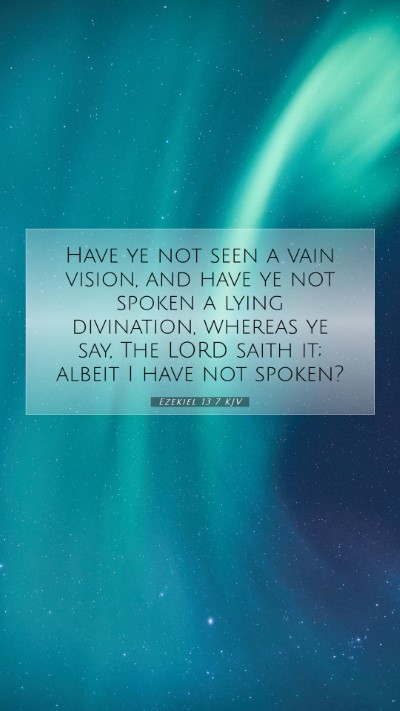Ezekiel 13:7 - Understanding the Verse
Ezekiel 13:7 states: "Have ye not seen a vain vision, and have ye not spoken a lying divination, whereas ye say, The Lord saith it; albeit I have not spoken?" This verse carries significant weight in the context of the prophet Ezekiel’s message to Israel.
Verse Meaning and Context
This passage highlights a crucial warning against false prophets. It underscores the importance of discernment when listening to those who claim to speak on behalf of God.
Summary of Commentary Insights
-
Matthew Henry: Henry stresses that the false prophets were not only misleading people but claiming authority from God. Their visions were described as "vain" because they lacked divine inspiration. He emphasizes the seriousness of misrepresenting God’s word and how it can lead the faithful astray.
-
Albert Barnes: Barnes offers insight into the nature of the divinations being described. He distinguishes between true prophecies and deceptive messages, arguing that such falsehoods erode the faith of believers. He notes that the prophets were confident in their deceptions, indicating a deep-rooted issue of integrity and truth.
-
Adam Clarke: Clarke draws attention to the consequences of proclaiming falsehoods in God's name. He elaborates on the accountability of those who preach misleading messages and the harm it does to the community. Clarke also points out that this reflects God's displeasure with such prophets who do not carry out His will accurately.
Significance of the Verse
The significance of Ezekiel 13:7 extends beyond its immediate context. It serves as a timeless reminder to evaluate the teachings we receive and to seek authentic biblical guidance. The verse highlights the danger of spiritual deception and the need for unwavering fidelity to God's true voice.
Applications for Today
- Discernment: Believers today should take heed of this warning, ensuring they are led by sound doctrine and biblical truth.
- Accountability: Those who teach and preach should embody integrity, being vigilant not to misrepresent God's word.
- Community Awareness: Supporting one another in faith involves discussing and evaluating teachings collectively, fostering a culture of truth within Bible study groups.
Cross References
- Jeremiah 14:14: Illustrates God's response to false prophets.
- Matthew 7:15: Warns against false prophets who come in sheep's clothing.
- 2 Peter 2:1: Discusses the emergence of false teachers among believers.
Conclusion
In summary, Ezekiel 13:7 serves as a grave admonition about the nature and consequences of false prophecies. Understanding Scripture in this context is vital for today’s believers, particularly in navigating the complexities of modern spirituality. The insights from respected commentaries deepen our bible verse understanding and significantly contribute to our bible study insights as we seek to apply these lessons in our daily lives.
Further Study
For those engaging in bible study resources or online bible study, consider exploring the historical context of the Old Testament prophets and how their messages apply to current teachings. This path of in-depth Bible verse analysis enriches one’s faith and strengthens community ties through shared learning.


